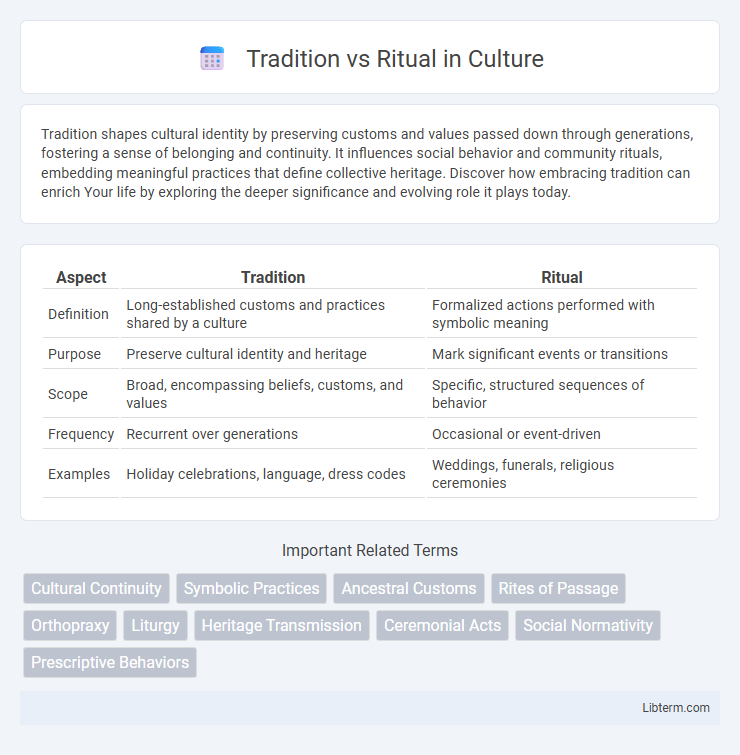Tradition shapes cultural identity by preserving customs and values passed down through generations, fostering a sense of belonging and continuity. It influences social behavior and community rituals, embedding meaningful practices that define collective heritage. Discover how embracing tradition can enrich Your life by exploring the deeper significance and evolving role it plays today.
Table of Comparison
| Aspect | Tradition | Ritual |
|---|---|---|
| Definition | Long-established customs and practices shared by a culture | Formalized actions performed with symbolic meaning |
| Purpose | Preserve cultural identity and heritage | Mark significant events or transitions |
| Scope | Broad, encompassing beliefs, customs, and values | Specific, structured sequences of behavior |
| Frequency | Recurrent over generations | Occasional or event-driven |
| Examples | Holiday celebrations, language, dress codes | Weddings, funerals, religious ceremonies |
Understanding Tradition: Definitions and Origins
Tradition refers to customs, beliefs, and practices passed down through generations, often rooted in historical and cultural contexts that shape collective identity. Unlike rituals, which are specific, repeated actions with symbolic meaning, traditions encompass broader social norms and values that evolve over time. Understanding tradition involves exploring its origins in cultural heritage, social functions, and the transmission mechanisms that sustain communal continuity.
The Essence of Ritual: Meaning and Purpose
Rituals embody symbolic actions that reinforce cultural values and social bonds, serving as meaningful expressions of identity and continuity. Unlike traditions, which encompass broader inherited customs, rituals are deliberate practices performed with specific intent and emotional engagement. The essence of ritual lies in its power to create a shared experience that fosters collective memory and a sense of belonging.
Key Differences Between Tradition and Ritual
Tradition refers to inherited customs, beliefs, or practices passed down through generations, shaping cultural identity and social continuity. Ritual involves specific, often symbolic, actions performed in a structured and repeated manner within a tradition or for particular purposes such as religious ceremonies or rites of passage. Key differences lie in tradition's broad cultural scope versus ritual's precise, formalized acts, with rituals serving as tangible expressions of underlying traditions.
How Traditions Shape Cultural Identity
Traditions serve as the cornerstone of cultural identity, embedding shared values, beliefs, and practices that connect generations and reinforce community bonds. Unlike rituals, which are often specific actions performed on particular occasions, traditions encompass a broader spectrum of social behaviors and narratives that evolve over time. Through storytelling, ceremonies, and customs, traditions preserve historical experiences and collective memory, fostering a strong sense of belonging and cultural continuity.
The Role of Rituals in Community and Belief
Rituals serve as vital expressions of shared values and beliefs that strengthen community bonds through repeated, meaningful actions. They provide a structured framework for collective identity, reinforcing social cohesion and continuity across generations. Embedded in cultural traditions, rituals offer psychological comfort and a sense of belonging, anchoring individuals within a larger belief system.
Tradition vs Ritual: Interconnectedness and Overlaps
Tradition and ritual share a deep interconnectedness, as traditions often encompass a collection of rituals passed down through generations, creating a sense of continuity and cultural identity. While traditions represent broader social customs and values, rituals are specific, repeated actions that embody and reinforce these traditions. The overlap between the two lies in how rituals concretely manifest traditions, making abstract cultural principles tangible and experiential.
Evolution of Traditions and Rituals Over Time
Traditions and rituals have evolved significantly over centuries, adapting to cultural shifts, technological advancements, and societal changes. While traditions often embody collective identity and historical continuity, rituals tend to focus on symbolic actions that reinforce beliefs and values. The dynamic evolution of both reflects the interplay between preserving heritage and accommodating contemporary contexts, ensuring their relevance across generations.
Modern Perspectives: Are Traditions and Rituals Still Relevant?
Modern perspectives emphasize that traditions and rituals remain crucial for fostering social cohesion and cultural identity in rapidly changing societies. Psychological studies highlight their role in providing structure, meaning, and a sense of belonging, which are essential for mental well-being. Despite globalization and technological advancements, sustaining cultural practices helps communities preserve heritage and navigate contemporary challenges.
Psychological and Social Impacts of Rituals and Traditions
Rituals and traditions play a crucial role in reinforcing social bonds by fostering a sense of belonging and collective identity, which enhances emotional well-being and reduces feelings of isolation. The psychological impact of rituals includes providing structure and predictability, which can alleviate anxiety and promote mental resilience during times of stress. Socially, traditions serve as a mechanism for transmitting cultural values and norms, ensuring continuity and cohesion within communities across generations.
Preserving Traditions and Rituals in a Globalized World
Preserving traditions and rituals in a globalized world requires intentional cultural documentation and community engagement, ensuring authentic practices are passed down through generations. Emphasizing local languages, traditional crafts, and festival observances strengthens cultural identity amid rapid global integration. Digital archives and educational programs serve as vital tools to maintain and celebrate diverse heritage in an interconnected society.
Tradition Infographic

 libterm.com
libterm.com